Projects
Our research on the advancement of sustainable energy and chemicals is strongly collaborative in nature. We, therefore, work with a strong network of academic and industrial partners. We are thankful for the support we receive for our projects.
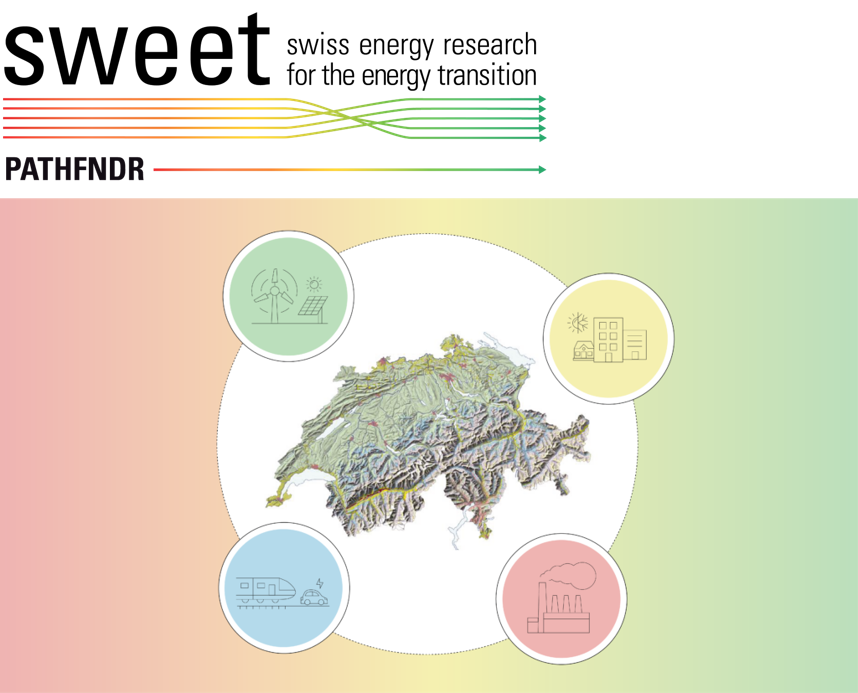
The PATHFNDR consortium is part of the first call of the Swiss Federal Office of Energy’s “SWEET” funding programme “Integration of Renewables into a Sustainable and Resilient Swiss Energy System”. The PATHFNDR consortium focuses on developing feasible pathways towards a sustainable, flexible, resilient, and cost-effective energy system for Switzerland through renewables integration. The project also looks into business models, policies, and public acceptance measures, as well as the integration of national and regional perspectives within the broader European setting.
Within this project, ETH Zurich investigates the role of sector-coupling as well as opportunities for flexibility across energy carriers and sectors in the pathways towards an optimal energy system.
Funding: external page SWEET funding programme, external page Swiss Federal Office of Energy (SFOE)
Duration: 1 June 2021 - 31 May 2027
Coordinator: Prof. André Bardow, ETH Zurich
Website: external page https://sweet-pathfndr.ch/
EPSE contact: Patricia Mayer

The National Centres of Competence in Research (NCCRs) are a funding scheme of the Swiss National Science Foundation. The NCCR Catalysis consortium aims at developing technologies permitting the defossilization of the chemical industry and zero-waste chemicals production. Therefore, it combines multidimensional and cross-disciplinary modes, including catalysis, chemistry, materials science, chemical and process engineering, and computer sciences, and fosters collaborative research across Swiss research institutions. On specific focus is to tackle life cycle analysis, catalyst scale‐up, reactor and process design, and pilot tests to secure the translation of discoveries into competitive plant-ready technologies.
Within this project, the EPSE group at ETH Zurich contribute to early-stage technology development for chemicals and plastics by leveraging recent advances in machine learning to develop predictive methods for process design and life cycle assessment.
Funding: external page NCCR funding programme, Swiss National Science Foundation (SNSF)
Duration Phase II: 1 August 2024 - 31 July 2028 (Phase I: 1 August 2021 - 31 July 2024)
Coordinator: Prof. Javier Pérez-Ramírez, ETH Zurich
Website: external page https://www.nccr-catalysis.ch/
EPSE contact: Jan Laub, Lukas Spiekermann
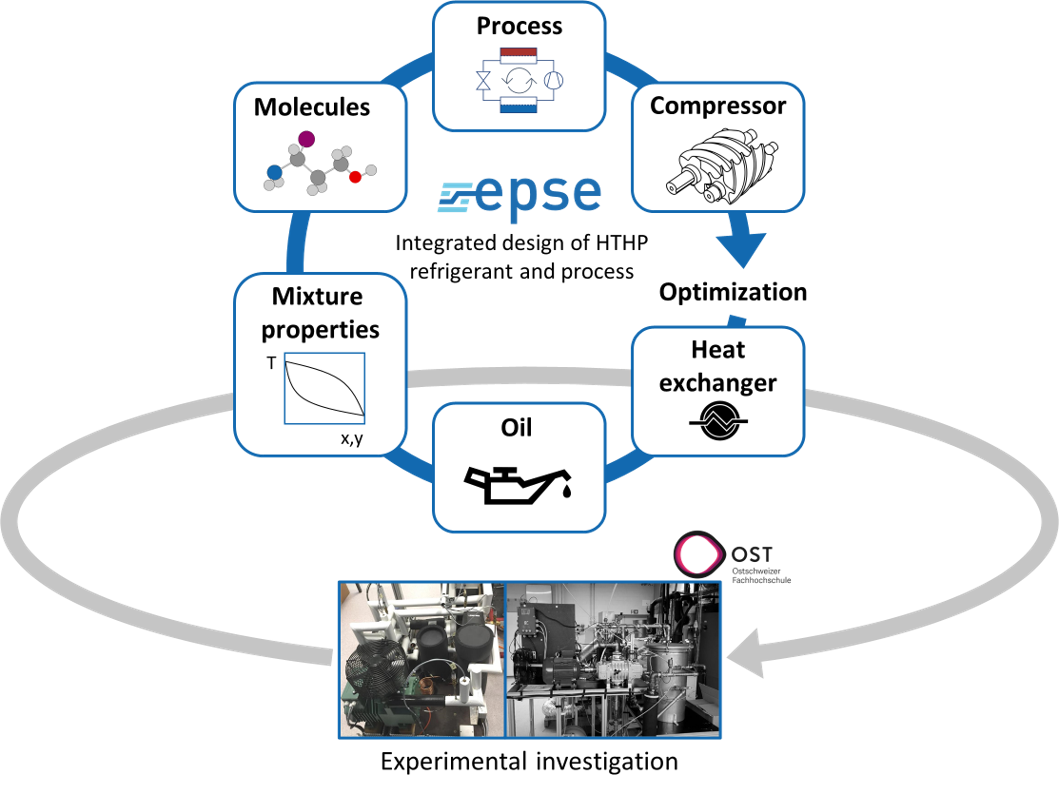
In this project, we develop the next generation of industrial high-temperature heat pumps in close cooperation with our project partners from the Eastern Switzerland University of Applied Sciences. These heat pumps will use refrigerant mixtures with temperature glide to increase the efficiency, temperature limits, and flexibility. To this end, we follow a holistic approach that connects an integrated refrigerant and process design with experimental investigations.
In our lab, we investigate how the techno-economic efficiency of high-temperature heat pumps can be improved by optimally adapting the refrigerants’ temperature glide to the manifold heat sources and sinks of industrial power-to-heat applications. This includes the design of suitable refrigerant mixtures and the development of heat pump processes and components capable of optimally utilizing the temperature glide. Furthermore, the project objectives include benchmarking and the development of handling guidelines to accelerate the technology’s market penetration.
Funding: external page BRIDGE Discovery joint fundig programme by the external page Swiss National Science Foundation (SNSF) and external page Innosuisse - Suisse Innovation Agency
Duration: 1 April 2022 - 31 March 2026
Coordinator: Prof. André Bardow, ETH Zurich
EPSE contact: Emiliano Casati
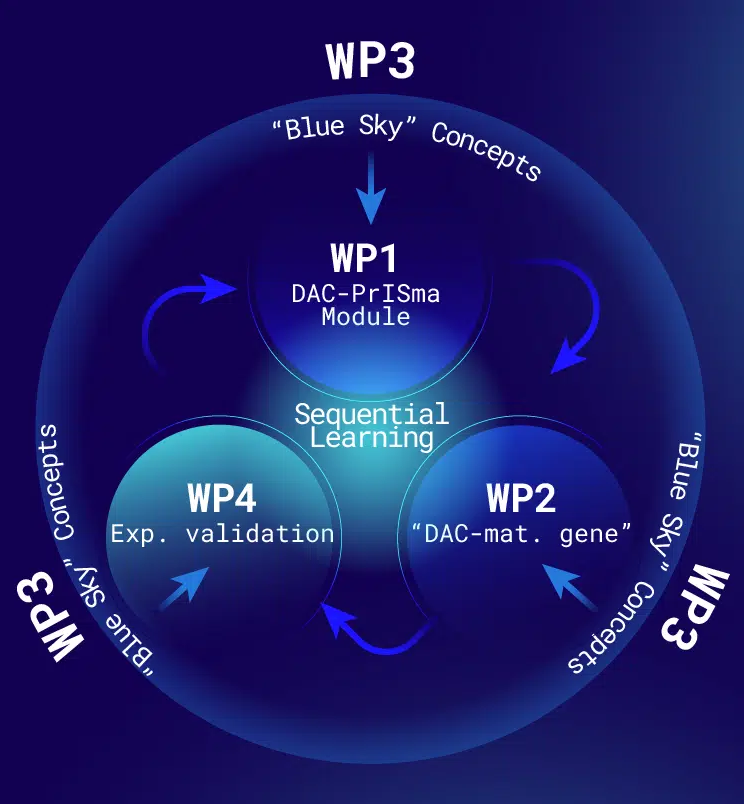
In the USorb-DAC project, a consortium of 5 world-leading research teams from Heriot-Watt University in the UK, EPFL and ETH Zurich in Switzerland, Lawrence Berkeley National Laboratory in the USA, and the Centre National de la Recherche Scientifique (CNRS) in France investigate the process-based design of tailor-made sorbent materials for sustainable direct air capture technologies. For this purpose, the PrISMa platform developed in the PrISMa project is extended to design cost-efficient and environmentally friendly direct air capture solutions and unlock the scalable potential of sorbent-based DAC.
Within this project, the ETH Zurich team is responsible for the predictive life cycle assessment layer to assess the environmental impacts of the sorbent materials used for direct-air capture in the early design phase.
Funding: external page The Grantham Foundation for the Protection of the Environment to RMI’s climate tech accelerator program, external page Third Derivative.
Duration: July 2022 – December 2025
Coordinator: external page Heriot-Watt University (UK)
Website: external page https://usorbdac.hw.ac.uk/
EPSE contact: Shaohan Chen, Julian Nöhl, Johannes Schilling
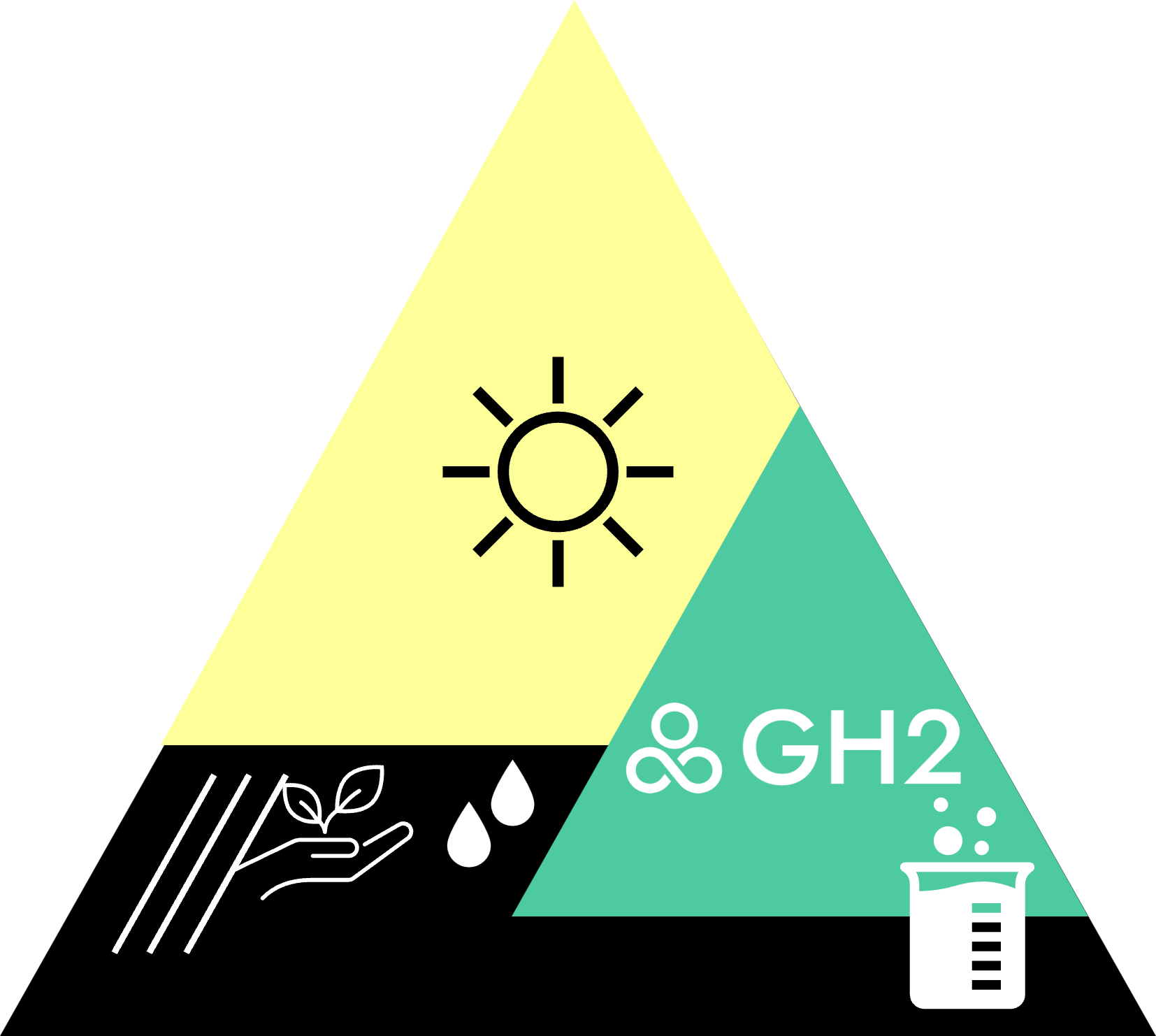
How can green hydrogen be produced sustainably? In the Green Hydrogen project, a zero-carbon technology is being developed that uses solar energy to gain green hydrogen and high-value chemicals from biomass. A consortium of nine European partners works in strong collaboration to design a scalable green hydrogen reactor for industrial use. By uniting expertise across multiple research areas among these partners, the technology is optimized to lower environmental impacts and increase the financial reward.
To achieve these goals, ETH Zurich applies life cycle assessment (LCA) and techno-economic analysis (TEA) methods to help find a sustainable solution.
Funded by the European Union. Views and opinions expressed are however those of the author(s) only and do not necessarily reflect those of the European Union or Innovate UK. Neither the European Union nor the granting authority can be held responsible for them.
Funding: external page Horizon Europe, external page State Secretariat for Education, Research and Innovation (SERI)
Duration: 1 October 2022 - 31 March 2026
Coordinator: external page Leitat
Website: external page https://www.gh2-project.eu/
EPSE contact: Eleonora Bargiacchi, Inga-Marie Lahrsen

This project has received funding from the European Union's Horizon Europe research and innovation programme under grant agreement No. 101070721.
The Horizon Europe project UPTAKE aims to facilitate the sustainable upscaling of carbon dioxide removal (CDR) methods by developing increasing the understanding of CDR technologies from a technological, cost, environmental and social perspective.
For this, an interdisciplinary consortium will develop a CDR knowledge inventory that will explore the costs, effectiveness, and removal potential of CDR technologies along with risks, real-world constraints, and side effects. As a result, UPTAKE will provide insights into a range of trade-offs, co-benefits, and opportunities emerging from technologies and their effects when integrated into a larger system to provide a basis for a just, inclusive, and sustainable transition towards net zero.
Within UPTAKE, the EPSE group at ETH Zurich focuses on the techno-economic assessment of direct air capture and bioenergy with carbon capture and storage.
Funding: external page Horizon Europe
Duration: September 2023 – August 2027
Coordinator: external page Centro Euro-Mediterraneo sui Cambiamenti Climatici
Website: external page https://www.cdr-uptake.eu/
EPSE contact: Vittoria Bolongaro

This project has received funding from the European Union's Horizon Europe research and innovation programme under grant agreement No.101081521.
This work has received funding from the Swiss State Secretariat for Education, Research and Innovation (SERI).

The refuel.ch project studies Renewable Fuels and Chemicals for Switzerland. For this purpose, 16 partners from industry and academia within Switzerland work together to enhance the sustainability and cost-effectiveness of renewable fuels and platform chemicals. A special focus of refuel.ch lies on the efficient use of Swiss bioenergy resources. The consortium will investigate how investment security can be improved by closing the knowledge gap between technical and non-technical aspects of sustainable fuels and platform chemicals. Robust and practical pathways will be developed for their market introduction and their integration into the Swiss energy system. To achieve this goal, inputs from social and natural sciences and engineering as well as from the dialogue with relevant stakeholders will be included. In parallel, innovative technologies currently at low technology readiness level will be advanced.
Within refuel.ch, the EPSE group at ETH Zurich is responsible for exploring and modeling routes to produce platform chemicals from different carbon sources. Furthermore, we develop flexible, economically efficient, and sustainable process concepts to produce fuels and platform chemicals.
Funding: external page SWEET funding programme, external page Swiss Federal Office of Energy (SFOE)
Duration: 1st January 2024 – 31st December 2029
Coordinator: external page EMPA
Website: external page refuel.ch
EPSE contact: Eleonora Bargiacchi, Johanna Lindfeld
Completed Projects

DemoUpCARMA focuses on the demonstration and upscaling of two pathways leading to negative emissions, an important element needed to achieve the Swiss climate goals by 2050. The project demonstrates the technical feasibility of using and storing CO2 captured at a Swiss industrial site via two pathways: (1) CO2 utilization and permanent storage in concrete in Switzerland via a novel mineral carbonation technology; (2) CO2 transport and permanent storage in a geological reservoir abroad using a novel injection technique.
DemoUpCARMA assesses the potential of upscaling these two pathways and of creating a CO2 network connecting Swiss CO2 industrial sources to CO2 storage options. The project studies the optimal network design considering techno-economic, environmental, and reliability aspects on the mid-and long-term time horizons. Finally, the project will address policy, regulatory and acceptance challenges to ensure the overall feasibility of carbon capture and storage solutions.
Within this project, the EPSE group at ETH Zurich conducts a life cycle assessment of the demonstrated CO2 supply chains and supports the integration of environmental targets into a computational network model.
Funding: external page Swiss Federal Office of Energy (SFOE) and the external page Federal Office for the Environment (FOEN)
Duration: 1 October 2021 - 30 September 2023
Coordinator: Prof. Marco Mazzotti, ETH Zurich
Website: http://www.demoupcarma.ethz.ch
EPSE contact: Johannes Burger, Julian Nöhl
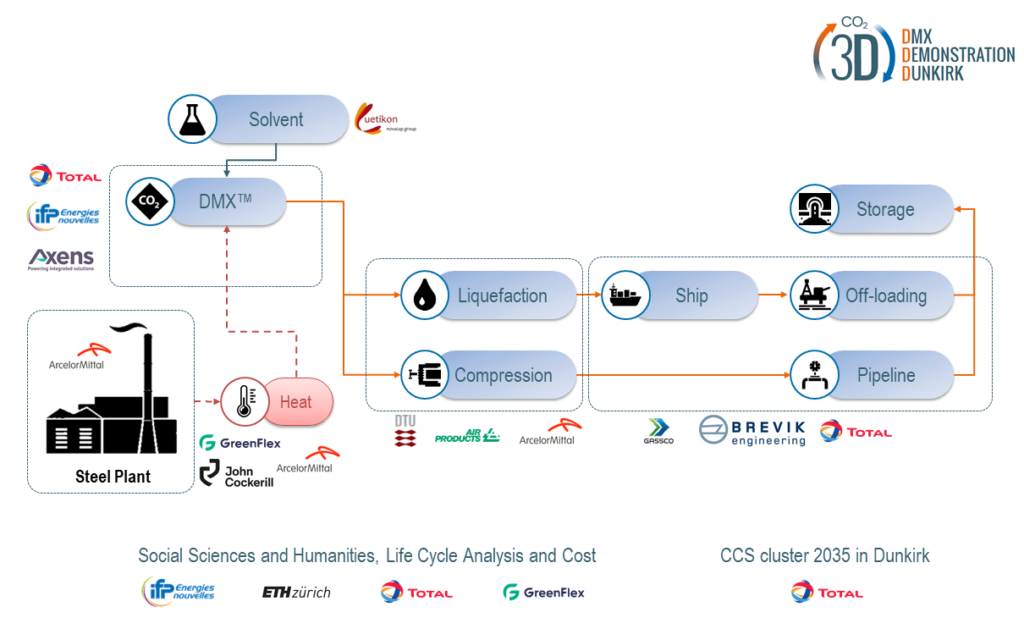
In the DMX™ Demonstration in Dunkirk (3D) project, a consortium of 11 European stakeholders will demonstrate an innovative process for capturing CO2 from industrial activities—the DMX™ process. The 3D project will realize a comprehensive study dedicated to developing a future European cluster in Dunkirk for carbon capture and storage in the North Sea.
Within this project, ETH Zurich accompanies the development of the industrial scale carbon capture and storage process with a life cycle assessment.
Funding: external page EU Horizon 2020
Duration: 1 May 2019 - 30 April 2023
Coordinator: external page IFP Energies nouvelle (FR)
Website: external page https://3d-ccus.com/
EPSE contact: Prof. André Bardow

This project has received funding from the European Union’s Horizon 2020 research and innovation programme under grant agreement No 838031.
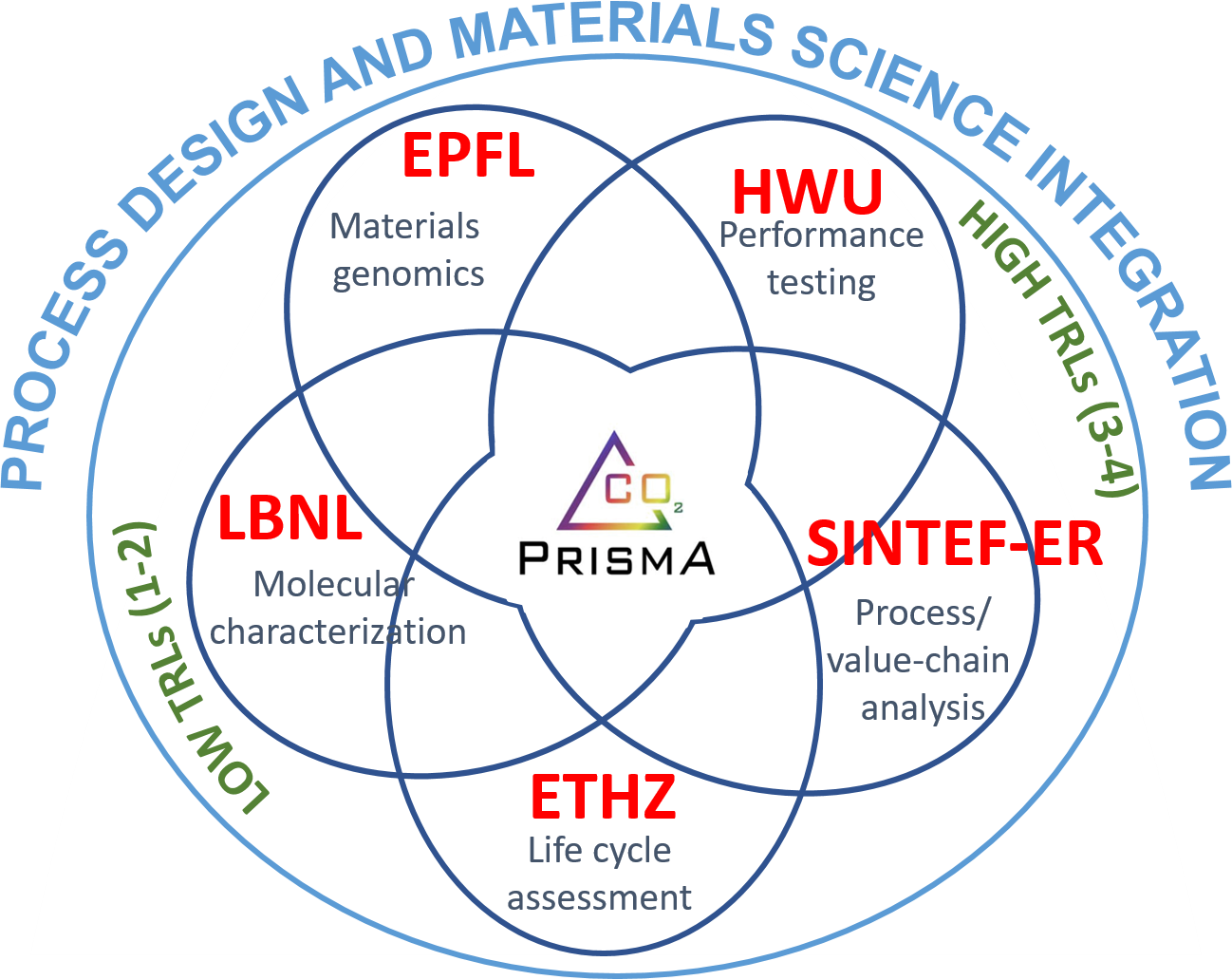
In the PrISMa project, a consortium of 5 world-leading research teams from Heriot-Watt University in the UK, EPFL and ETH Zurich in Switzerland, Lawrence Berkeley National Laboratory in the USA, and SINTEF-ER in Norway investigate the process-based design of tailor-made sorbent materials for efficient carbon capture. For this purpose, a technology platform is developed to design cost-efficient and environmentally friendly carbon capture solutions for various CO2 sources and sinks.
Within this project, ETH Zurich explores how environmental aspects can be incorporated in the materials screening and how data-driven materials approaches can be used to assess materials on the process-level efficiently.
Funding: external page ACT programme (Accelerating CCS Technologies, ERA NET Cofund under external page EU Horizon 2020) and the external page Swiss Federal Office of Energy (SFOE)
Duration: 1 September 2020 - 31 March 2023
Coordinator: external page Heriot-Watt University (UK)
Website: external page https://prisma.hw.ac.uk
EPSE contact: Johannes Schilling

ACCSESS is a European project that aims at enabling cost-effective, replicable, safe and flexible carbon capture, utilization and storage (CCUS). The project takes a cross-sectoral approach, addressing pulp and paper, cement, waste to energy, and biorefining, that all have the potential to contribute to carbon dioxide removal (CDR).
ACCSESS has the ambition to unleash the ability of CCUS to contribute to the EU Green Deal transformation strategy, and the ACCSESS concept is centered around the vision to develop replicable CCUS pathways towards a climate-neutral Europe in 2050. The project therefore addresses the full CCUS chain, from capture to transport to storage, from a techno-economic, environmental and societal perspective.
Within ACCSESS, the EPSE group at ETH Zurich focuses on assessing the environmental impact of the CCUS chains and the optimal rollout of an infrastructure to provide access routes to storage sites for CO2 emitters in continental Europe.
Funding: external page EU Horizon 2020
Duration: 1 May 2021 - 30 June 2025
Coordinator: external page SINTEF Energi AS
Website: external page https://www.projectaccsess.eu/
EPSE contact: Johannes Burger, Julian Nöhl

This project has received funding from the European Union’s Horizon 2020 research and innovation programme under grant agreement No 101022487.

In the CIRCULAR FOAM project, a consortium of 22 partners from industry and academia from 9 countries aims to boost the recycling of high-performance insulation material across Europe. For this purpose, a complete circular value chain will be established for rigid polyurethane insulation foams used in refrigerators and the construction industry. The project considers the technical perspective of circular value chains and the societal acceptance for successful regional implementation.
Within this project, ETH Zurich is responsible for the life cycle assessment of the circular value chain to minimize cradle-to-grave environmental impacts from converting end-of-life polyurethane rigid foam to high-value chemicals. Furthermore, we investigate the conceptual process design and thermo-economic analysis of the novel chemical recycling routes to develop a flexible and economically efficient process concept for chemical polyurethane recycling.
Funding: external page EU Horizon 2020
Duration: 1 October 2021 - 30 September 2025
Coordinator: external page Covestro Deutschland AG
Website: external page www.circular-foam.eu
EPSE contact: Martin Pillich

This project has received funding from the European Union’s Horizon 2020 research and innovation programme under grant agreement No. 101036854.

An optimal combination of solid, fluid, and process is necessary to exploit the potential of adsorption processes fully. Several thousand nanoporous materials are already known, which provides great flexibility in selecting solids as adsorbent material for a process. However, an experimental investigation of all possible adsorbents would take much time. For this reason, a systematic, computer-aided approach for an efficient selection of solids is required.
Such an approach for the integrated design of adsorption processes and solids adsorbent materials is developed within this project in close collaboration with the Institute of Thermodynamics and Thermal Process Engineering at the University of Stuttgart. We use a novel, physically sound thermodynamic model based on classical density functional theory and PC-SAFT to calculate the required adsorption properties. The efficiency and accuracy of the model make it particularly promising for an integrated design method.
Funding: external page Weave/Lead Agency external page - Deutsche Forschungsgemeinschaft (DFG - Grant number: 497566159), external page Swiss National Science Foundation (SNF - Grant number: 206981)
Duration: 1 October 2022 - 30 September 2025
Coordinator: external page Prof. Joachim Gross, University of Stuttgart
Website: external page https://data.snf.ch/grants/grant/206981
EPSE contact: Marcel Granderath